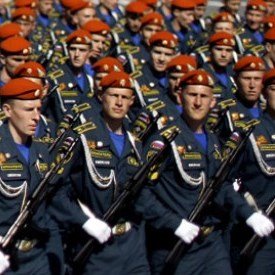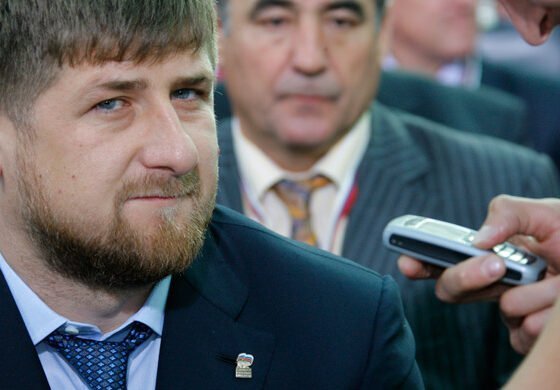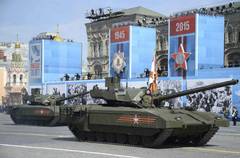This year, there were a lot of foreign defense ministers participating in the Moscow Conference on International Security. In fact, there were so many that the organizers had to take an unscheduled break as the conference running well over time, with Russian Defense Minister Sergei Shoigu notably absent after the panel resumed. In this post, I will summarize the most interesting of the presentations. Videos of all the plenary speeches are available on the Russian Defense Ministry website.
Not surprisingly, the first slot in this lineup was given to Chang Wanquan, the Minister of Defense of the People's Republic of China. Minister Chang focused on the development of a multipolar world as the center of gravity in international affairs has moved in recent years. He noted that some countries (not mentioning the U.S. by name) have been trying to obtain absolute security, which has complicated the international situation. China has been promoting a comprehensive vision of global security, focused on the need for a fair international order, the idea that common development enables security, and the primacy of dialog and cooperation over threats and the use of force. He noted that the PLA has been focused on safeguarding national sovereignty and territorial integrity, as crises on China's periphery have been causing insecurity for the country. He also mentioned the role of the PLA Navy in conducting evacuations from Yemen and Libya and conducting other humanitarian missions such as disaster assistance and providing medical help for the Ebola crisis in West Africa. He highlighted the need to commemorate the victory over Nazism in World War II and the steps that China has been taking to promote development through the AIIB Bank and various Silk Road initiatives. Minister Chang concluded with a discussion of new efforts to conduct military dialog and increase military cooperation between China and the United States as part of efforts to counter terrorist threats and violent extremism. The overall perception from the speech was of China performing a careful balancing act between supporting Russia as the conference host while telegraphing that it was not interested in getting involved in any kind of confrontation with the United States.
This year, there were a lot of foreign defense ministers participating in the Moscow Conference on International Security. In fact, there were so many that the organizers had to take an unscheduled break as the conference running well over time, with Russian Defense Minister Sergei Shoigu notably absent after the panel resumed. In this post, I will summarize the most interesting of the presentations. Videos of all the plenary speeches are available on the Russian Defense Ministry website.
Panos Kammenos, the Greek Defense Minister, was the only senior military official from a NATO country to make a presentation. He began with a statement highlighting the strong ties between Greece and Russia based on spiritual and historical connections, as well as on the two countries' joint fight against fascism. He mentioned the dangers posed by terrorism and by new asymmetrical and hybrid security threats. The financial crisis that has affected the European Union has led to an increase in instability. Traditional security problems have been joined by new threats, such as ethnic and religious conflict, mass migration, and the dissemination of arms to non-state actors. He argued that the greatest security threat is posed by terrorism and religious conflict in the Middle East and the role of Greece as the bastion of Europe in this area. In this context, he mentioned the significance of Greece's Hellenic initiative to protect Christians in the Middle East. He concluded by noting that security cannot be divided into internal and external areas. The same terrorist groups are attacking both the U.S. and Russia, so there is no choice but to have both countries working together to resolve this crisis.
The Pakistani Defense Minister, Khawaja Muhammad Asif, highlighted the emergence of new security threats in the last years. He noted that the radicals of the Islamic State have created a transregional crisis that has heightened the danger of the fragmentation of the modern state order. Conflicts in Syria, Iraq, Libya, and Yemen can all be viewed as outcomes of failed regime change, the Arab spring and regional conflict. The old order in the Middle East is dying, while external powers are the only force preventing the emergence of a new order based on religious radicalism. Local extremists in Southeast Asia and Africa are losing foot soldiers to transnational groups such as the Islamic State and Daesh. The region needs a comprehensive social, economic, and political reform package that must be combined with ongoing military actions. 200 thousand Pakistani soldiers are currently fighting terrorists in northwest Pakistan. We need to compromise on principles to ensure that the conflict ends (referring to Charlie Hebdo and Muhammad cartoons).
The Iranian Defense Minister, Hossein Dehghan, started by describing ISIS as a global cancer that has support from foreign states. He blamed the United States and Israel for using these groups to change the strategic balance in the region. He made a very strong statement against Saudi aggression in Yemen, arguing that as a result in the future Saudi Arabia will face the same situation as Saddam Hussein did. He argued that Saudi Arabia has killed many civilians through its aerial bombing campaign and needs to stop supporting terrorism in the Middle East. The international community needs to stop foreign interference in Yemen. Iran, by contrast, is a factor for stability in the region. He then turned to U.S. cyber attacks on Iran and the role of the U.S. as a threat to international security. He proposed a multilateral cooperation initiative between Iran, Russia, China, and India against U.S. missile defense and other international threats. He highlighted that Iran is focused on the peaceful use of nuclear energy.
The North Korean Defense Minister, Hyon Yong Chol, did not pull any punches in his speech. He started by arguing that the U.S. is the greatest threat to world peace and has caused an increase in the risk of war on the Korean peninsula by its actions. He called the U.S. and South Korea a cancer, because they want to overthrow the DPRK and dominate northeast Asia in order to put added pressure on Russia and China. He called the 1953 armistice worthless and argued that North Korea has been threatened by a U.S. nuclear attack. Efforts to have dialog with the U.S. did not achieve any results as it became clear that the U.S. just wanted to eliminate North Korean nuclear weapons without creating a peace deal. "If we had peace, we would not need nuclear weapons." If the U.S. were to suspend joint exercises with South Korea, North Korea would stop its nuclear program. Instead, the U.S. is trying to create an Asian NATO.
The Indian Defense Minister, Rao Inderjit Singh, highlighted that most nations have now given up some of their sovereignty to various transnational bodies, as the have recognized that traditional state instruments are not adequate to respond to modern threats. Non-state actors are becoming orchestrators of conflict. States can't reign them in or are even tacitly encouraging them in some cases. Responses need to combine hard and soft power. Conventional wars have declined in recent years, as have civil wars. Now, multi-polarity is allowing old rivalries to reemerge. In addition, there are new forms of threat from resource scarcity and climate change. Armed forces have to be prepared to fight both high end threats and irregular warfare. Space, cyberspace, and even underground warfare are now part of the war environment and have to be taken into account. Rapid technological innovation will help wealthy states and local entrepreneurs of violence, while potentially hurting the middle powers.
—-
This comment is also available at Russian Military Reform.











